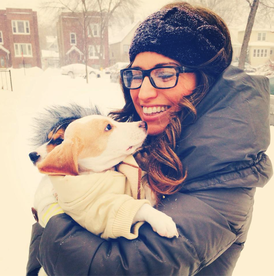 Katherine in the snow with her fur babies. Katherine in the snow with her fur babies. By: Katherine Perez I am honored to be acknowledged for my leadership. I represent a little girl who grew up feeling a little weird and always out of place. My emotions ran higher than Mariah Carey's whistle register and deeper than a Barry White song. My routines were sacred. I would die if I didn't do them. I know what it's like to make the agonizing decision to keep living. I also know what it's like to keep these experiences hidden and to navigate school, work, and a personal life that can be unforgiving. My sister, unlike me, has an apparent disability. Students threw pencils at her and called her the "R" word. She would sob to me after school about this. As an adult with intellectual disability, she now faces the burden of a society that provides no options and appears to not value her life. It hasn't been easy, but I have channeled the intensity of my convictions to advocate for those who know why the changes we seek can mean life or death. Having a disability can be a deeply individual experience and feel incredibly isolating. As someone with a non-apparent disability, I have felt lonely for much of my life. No one could possibly understand, I thought. But, it simply wasn't true. While no two people are exactly alike, I've found that everywhere I have shared my story, people can relate. From the halls of Capitol Hill to UCLA Law school, and even in Peru, where I lived for two years, I always created connections with people who shared my experience. I've learned that if we want community, we need to consciously build it. This isn't an easy task, and it isn't going to happen over night, but it is so worth it. Everywhere you look in history, Disabled people have been organizing and fighting to be treated with dignity. Our work is an extension of this. As Latinxs, we face multiple barriers. The intersectional approach to our coalition acknowledges that systems of oppression often work together. Just as ableism and racism are intertwined, we seek to builds bridges between Latinx and Disability advocacy organizations and efforts. This type of intersectional work is what will sustain our respective rights movements. My family immigrated from Mexico to California starting in the 1940s. My grandmother, who is originally from Zacatecas, instilled the drive for education and becoming mujeres poderosas in our family. I'm reminded that she always told me to be proud to speak up and celebrate my achievements because she had learned that no one else was going to do it for her. She is a trailblazer who didn't let anyone hold her back even when they told her she couldn't teach English or become a principal because she had a heavy accent. She did both. Although my anxiety rears its ugly head telling me not to put myself out there for scrutiny, I do so because sharing my story is important. It's important that we all have the courage to share our stories. Because if we don't share our stories, our stories get erased. We must do so especially when society tells us that our lives are unworthy. And while we are celebrating the good, we must also call out the bad. I have had the great privilege to work with an incredible group of Disabled Latinxs and allies over the last several months in creating the National Coalition for Latinxs with Disabilities (CNLD). Any praise that I receive for CNLD is praise for a shared effort. And on behalf of our group, I urge all of you who know what it's like to feel like "a little weird and out of place" (and those who are allies) to join us in solidarity! I promise you that I will continue to work my hardest as one of the leaders in this movement. AAPD Paul G. Hearne Leadership Award Recipient Announcement
1 Comment
|
Authors.Members of CNLD regularly write posts, though we accept posts from our audience! Archives
January 2019
Categories |

 RSS Feed
RSS Feed